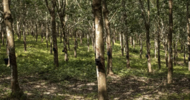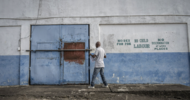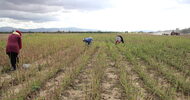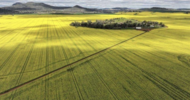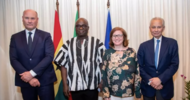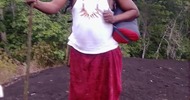Pambazuka | 6 May 2010
Sierra Leone: Protecting investors, but what about the people? Dissecting the contradictions of agricultural investment
Joan Baxter
Analysis The large-scale acquisition for industrial agriculture in African and other developing countries has been described as a global land grab, 'threatening food, seed and land sovereignty of family farmers, social stability, environmental health and biodiversity around the world', writes Joan Baxter. While it is understandable that investors deny that this kind of agricultural investment is a ‘land grab’, says Baxter, what is perplexing is that ‘the same kind of rhetoric is coming from some whose job it is to protect Africa’s farmers’ rights and their farmland from exploitative foreign takeover’. On 25 April 2010, representatives from a host of organisations and nations with the clout to shape policies and millions of lives around the world gathered for a Roundtable at the headquarters of the US Millennium Challenge Corporation in Washington. Among them were representatives from the World Bank Group, Japan, the US, the UN Food and Agriculture Organization (FAO), African governments and the African Union Commission. Their stated aim was to 'facilitate a dialogue among government representatives, multilateral agencies, civil society, and the private sector to further explore progress and advancement of ongoing work related to principles for responsible agricultural investment.'[1] Others prefer simpler language. They describe the form of agricultural investment under discussion at the Roundtable, which involves large-scale land acquisition for industrial-style agriculture in African and other developing countries, as a global 'land grab'. They say there is no way it can be 'responsible' because it threatens food, seed and land sovereignty of family farmers, social stability, environmental health and biodiversity around the world.[2] According to Devlin Kuyek of GRAIN, the international NGO that has been drawing the world's attention to the land-grab issue, the Roundtable was 'a smoke and mirrors show to dampen the escalating social backlash threatening land grab investors.' He was one of the activists who travelled to Washington to protest in front of the Roundtable venue in Washington. Well over 100 farmer, civil society and non-governmental organisations and broad-based coalitions around the world have signed onto the campaign, 'Stop land grabbing now!'.[3] The investors and the proponents of this kind of agricultural investment in Africa deny it is a land grab.[4] They say that the investments are positive, providing jobs and infrastructure, posing no threat to food security even if the food and agrofuels they produce are for export. Such a stance is understandable; it would be unrealistic to expect an objective assessment of such foreign direct investment from the nations, corporations, investment banks and funds, and billionaire tycoons that stand to profit from it. What is perplexing, however, is that the same kind of rhetoric is coming from some whose job it is to protect Africa's farmers' rights and their farmland from exploitative foreign takeover. By this, I mean African heads of state and other elected representatives of the people, as well as some holding key positions in Africa's regional economic and political bodies. Take, for example, the views of Sindiso Ngwenya, secretary general of Comesa, the Common Market for Eastern and Southern Africa. He calls the agricultural investment in the region, particularly by Gulf States, a 'win-win' partnership.[5] Egypt's minister of investment, Mahmoud Mohieddin, says that if foreign investors exploit an African country, it's the fault of the country itself because individual countries have the obligation to protect themselves. In the words of Minister Mohieddin, 'If your country doesn't provide this kind of policy priority in its investment policy, don't blame those who are coming to exploit and extract. The issue of responsible investment lies with the government and all of these things should be established.'[6] The question is: Are African governments being responsible and putting protection of their own people ahead of, or at least on par with protection for the investors? Listening to some African leaders, it doesn't look that way.[7] Some defend the investors' acquisition of land in their countries, saying it is 'virgin' or 'under-utilised' or 'uncultivated' or 'degraded' land and they applaud the 'modernisation' of agriculture with agribusiness that is heavy on the use of imported seed and environmentally destructive machinery, chemicals and irrigation. This suggests they know precious little about the importance of fallows and the resilience and diversity of agroforestry systems, or about sustainable agriculture and the knowledge base of their own farmers in using soil, tree, water and genetic resources wisely and productively, particularly in the face of climate change. It certainly shows they have not read or understood the world's most comprehensive study of agriculture, the International Assessment of Agricultural Knowledge, Science and Technology for Development (IAASTD). It was done by 400 scientists over many years and it showed that agro-ecological farming is the best - the only - sustainable approach to land use.[8] So did the recent study by the United Nations Environment Program on the appropriate response to the food crisis and to climate change.[9] Even less comprehensible is that some African leaders seem to be prostrating themselves at the feet of the investors, competing to outdo each other to court them with generous tax holidays and concessions. Such giveaways cast doubts on how cash-strapped African governments will benefit at all from such investments. So the next question is: Why are Africa's leaders so eager to sell out their own farmers by leasing their precious land (water, soils and other natural resources) to foreign interests? Is it just because of their own lack of understanding of the value of agro-ecological agriculture and environmental sustainability? Or are they also being influenced by imported ideology and neo-liberal ideologues from major international financial institutions? It appears the answer is both of the above. THE WORLD BANK GROUP AND FOREIGN INVESTORS FIND FRIENDS IN SIERRA LEONE Take the case of Sierra Leone. Its president, Ernest Bai Koroma, says that he wants to run his country 'like a business' and that his background in the private sector as an insurance broker gives him the know-how to do that.[10] President Koroma recently praised the economic and political reforms that have made his country 'climb 20 places in the World Bank's annual Doing Business rankings in the last three years, and made Sierra Leone one of the top 5 countries in Sub-Saharan Africa for investor protection and the ease of starting a business.'[11] The importance of 'investor protection' surfaces frequently in interviews with President Koroma's business-friendly team. His special advisor on the private sector, Oluniyi Robbin-Coker, formerly of Citibank and the World Bank's International Finance Corporation (IFC), refers to it so often during an interview about large-scale land acquisition and agricultural investment in Sierra Leone that I finally ask him if the government is so busy protecting investors that it is neglecting to protect itself and its people. 'We have to take a long-term view and a broad view,' he replies. 'So in the short term, we may have to make some concessions in order to get the businesses up and running and profitable.' He refused to say just what incentives or tax holidays the government of Sierra Leone was offering to Addax Bioenergy for its 'flagship' agricultural investment in the country, a giant sugarcane plantation to produce ethanol for export to Europe, to fuel European vehicles. Addax Bioenergy is part of the Addax & Oryx Group of Swiss billionaire, Jean Claude Gandur, who has a long record of oil and mining business in Africa.[12] Even if Robbin-Coker wouldn't divulge what concessions had been made for Addax Bioenergy in Sierra Leone, the website of the Sierra Leone Investment and Export Promotion Agency (SLIEPA) said that agricultural investors enjoyed a 10-year corporate tax holiday (although that information later disappeared from the SLIEPA website, coincidentally, after I quoted it in the media). SLIEPA itself makes an interesting study. According to its enthusiastic director of investor promotion, Raymond Kai-Gbekie, SLIEPA was established by an act of Sierra Leone's parliament in 2007 and is financed by the IFC and the UK's Department for International Development (DFID). Like other such 'one-stop-shops' for investors that the IFC has been setting up in African nations (and around the world), SLIEPA's mission to 'assist and inform investors and exporters' may initially look almost banal.[13] How it assists investors, however, is more telling. SLIEPA boasts that a new Investment Code has gone into effect, which 'was designed to provide more protection for companies investing in Sierra Leone ... full foreign ownership is allowed ... there is no discriminatory economic or industrial strategy against foreign investors, and no limit is imposed on foreign ownership or control.'[14] Kai-Gbekie becomes very animated when he recalls his meetings with illustrious billionaire investors, royalty and dignitaries who attended last year's Sierra Leone Trade and Investment Forum, partly organised by former British Prime Minister Tony Blair's 'charity', the African Governance Initiative. Asked why the forum to promote and sell Sierra Leone's assets to the world was held in London rather than in Freetown, Kai-Gbekie replies, 'As a nation, backed by an ever-ready and energetic private-sector-led president, we had to go to London to make ourselves known, that we have no business being poor, and that we have 5.4 million hectares of land and less than 20 per cent is under cultivation.' He admits there is 'a lot of controversy' on whether it is wise to invite, even bend over backwards to woo investors to lease huge tracts of Sierra Leone's farmland to produce agrofuels for export in a country still trying to regain its own food security after a long civil war. Then he adds, 'Against this backdrop we had to look for hired guns, brought in by IFC, two gentlemen, Simon Bell and Julien Haarman, they were here and they came up with strong arguments.' So, SLIEPA and the IFC were using 'hired guns' to come up with 'strong arguments' to promote large-scale land acquisition for agrofuel production - from palm oil and sugarcane for export to Europe. One of them, Simon Bell, who presented the 'Sugar Opportunity in Sierra Leone' at the London Forum, was described as an 'advisor to the Government of Sierra Leone on Sugar Investments'.[15] But the IFC with its one-stop-shops for investors and 'hired guns' within government ministries is just one of the tools the World Bank Group employs to open up the continent to direct foreign investment and press for reforms that benefit and protect foreign investors. There is also the IFC's Investment Climate Advisory Service (FIAS), which 'helps governments implement reforms to improve their business environment, and encourage and retain investment.'[16] Yet another is MIGA, the World Bank's Multilateral Investment Guarantee Agency. MIGA protects investors from losses caused for a host of reasons, including if a government were to take political action, say, to protect its own citizens when it sees an investor causing harm or social and environmental upheaval. 'MIGA acts as a *potent restraint* on potentially damaging government actions,' says DeRisk Advisory Services, an authorised marketing agent for MIGA. 'MIGA's leverage with host governments frequently enables the agency to resolve differences.'[17] [emphasis added] With such powerful World Bank machinery working on behalf of the investors, and working so closely with and within African governments, it certainly seems that the playing field has been systematically tilted to favour the investors rather than local people. The Oakland Institute says the IFC and FIAS have been instrumental in promoting foreign access to developing countries' land markets, threatening food security and local populations, and it calls for an investigation into the workings of the IFC and FIAS technical assistance and advisory services.[18] Meanwhile, African governments themselves and their one-stop-shop investment agencies seem to have become the investors' most vocal cheerleaders. That is certainly the impression Raymond Kai-Gbekie gives in the IFC- and DFID-backed SLIEPA office in Freetown. He dismisses my suggestions that the two IFC 'hired guns' promoting investment in land for agrofuels in his country might not be the most objective sources. Then he launches into another round of praise for both his president and the Addax Bioenergy project. 'I want to tell you the time for change is here,' he says. 'We have a president who launched an agenda for change and that agenda for change is a package for even the poor.' Kai-Gbekie sees the Addax project as part of this package, and tells me that it will have '6,000 employees'. This figure contradicts ones that other officials have given for the project and it is one of many contradictions that abound about the Addax project. While Kai-Gbekie told me it would employ 6,000 people, a few weeks later a press release from the Office of President Koroma stated that the Addax project would assure 4,000 jobs and cost US$200 million.[19] The same press release quotes Addax Bioenergy managing director Nikolai Germann as saying it would take '20,000 hectares of land'. But the Addax Bioenergy website says it will involve 10,000 hectares and cost about 200 million Euros, employing more than '2,000 people'.[20] President Koroma says that it will cost US$400 million and involve 30,000 hectares.[21] The official Environmental, Social and Health Impact Assessment (ESHIA) done by a South African consulting company for the Addax project says it will involve 15,500 hectares and directly employ 2,200 people.[22] Oluniyi Robbin-Coker, the president's special private sector advisor, told me it would eventually cover 40,000 hectares. In 2008, Addax Bioenergy's project manager, Andrew Turay went to Europe to give a presentation at the European Parliament Roundtable on Sustainable Biofuel Production in Tropical and Subtropical Countries. In his presentation he said the project would cover 26,000 hectares.[23] And he made it clear the ethanol production was for the European market. Yet in 2009, Turay told me that the ethanol would be for 'local use and an export crop.' He said that the sugarcane could produce both ethanol and sugar. He added, 'We import a lot of sugar into this country', implying that Addax could help Sierra Leone reduce those sugar imports. He also told me the project would produce between 30 and 60 MW of renewable energy from sugarcane residues, which would be pumped into the national grid. However, the Addax website says that the generation plant will be able to export (sell) about 15 MW to the national grid, and makes it clear that the sugarcane is for ethanol production only and the ethanol is for export. Turay told me the Addax project would be producing ethanol for 'the next 100 years'. Member of parliament for the project area, Martin Bangura, told me Addax would employ 4,000 people directly and that the initial lease was for 50 years, renewable for 21 years. All of these are contradictions are coming from the people who are speaking on behalf of the project, who should, in theory, know of what they speak and be sure they are offering the public accurate information. The Honourable Martin Bangura calls himself the 'champion' of Addax because he is the 'bridge' between Addax and his constituents. He tells me that to build confidence between the project and the people he sometimes had to 'sleep two or three nights in villages'. His idea of consultation with the local people is apparently to offer them all kinds of reassurances, provided to him by Addax, that the project would bring only benefits. Although he claims he read the ESHIA, he seems unaware of the potential risks listed in the report. Asked about the potential health and environmental risks of the spraying of pesticides and herbicides on the plantations, the heavy use of fertilisers, the run-off into rivers and onto the pockets of land around them on which local people were assured they would still be able to farm their rice, Bangura responds by saying that Addax had set up 'suggestion boxes' and given local people one month to submit their concerns or suggestions. A woman in one of the villages in the area points out to me that the suggestion boxes 'make no sense' since the majority of the local people cannot read or write. In villages in the project area, even among those young men who say they are eager for the project to start so they can be employed, I find no one who has any idea how much land or what lands are involved in the project. A local chief in the area, whose responsibility as custodian of the ancestral lands should really have propelled him to protect them from foreign takeover, has already accepted a job driving a tractor for Addax. Asked if he has any concerns about the potential noise, pollution, and disruption to local communities, farms and lives, he replies that he is 'very happy' because he now earns '200,000 Leones (about $US50) bulk' a month and 'besides, at the work site they have electricity and we don't have to pay to charge our mobile phones.' I meet women farming on the land, producing enough income to send their children to school and care for their families, who aren't even aware the project is coming. No one I meet in the area is aware that there will be large-scale use of chemical pesticides and fertilisers on the sugarcane plantation that could affect their health or the health of their crops in surrounding lands, or that some communities will have to be resettled. No one has read the weighty ESHIA - hardly surprising with an illiteracy rate of close to 90 per cent and no access to the document. Some are afraid to speak to me at all for fear of repercussions from those who are promoting and hope to benefit from the project, either because of a job or by leasing land, for which Addax will pay US$12 per hectare per year, in a complex arrangement that divides it among landowners, District and Chiefdom Councils and the national government.[24] The ESHIA identifies several 'issue/impacts' - on human health, on the natural ecosystem, involving contamination of aquatic resources and soils by pesticides and fertilisers, that are described as 'moderately severe' despite recommended 'mitigation measures', which would have to be closely and independently monitored throughout the life of the project. It also points out that because the project is seeking funding from European development banks, it has been geared to meet 'Performance Standards' on environmental and social sustainability, as laid down by none other than the World Bank agency that has been so active in promoting the land deals - the IFC.[25] The proverbial fox not just guarding but also setting the rules for the hens and the henhouse? Given the chronic lack of resources in Sierra Leone for monitoring other extractive industries - particularly its diamond sector - one has to ask if it's realistic to believe that the government will be able to carry out the requisite independent and credible monitoring of the Addax project.[26] GENUINE 'RESPONSIBLE' AGRICULTURAL INVESTMENT WOULD PROTECT FAMILY FARMERS AND FARMLAND The Addax Bioenergy project in Sierra Leone is just one example of the agricultural investment on-going in that country, where at least three more European companies are each seeking to lease 40,000 hectares for palm oil for agrofuel for export. And it is just one relatively modest case in Africa where hundreds of large land deals have already been signed and sealed, giving foreign investors and nations control over many millions of hectares of African farmland. But the Sierra Leone case does reveal much about the way the land deals are being made, the contradictory information being given out about them, what local people are actually being told (and not being told) about the high stakes involved. It also reveals the powerful machinery of the World Bank Group at work inside African governments that promotes the land deals, and the considerable powers of the investors awash in capital to sway government and public opinion. Most importantly, it helps explain why, even if it is the obligation of African governments to protect their own people from exploitative investment - as Egypt's minister of investment says - instead some seem intent on protecting the investors who are coming to their countries to 'exploit and extract.' Protection for local people, their land, soil, genetic resources and their water, has been whittled away piece-by-piece under the tutelage of the World Bank Group and its donor partners. Until African governments recognise the immense potential of their own farmers and their sustainable, diverse family farming systems, that are so desperately in need of genuine 'responsible' agricultural investment to assure food and seed sovereignty and access to micro-credit and markets, it seems likely they will continue to protect and favour the powerful investors - and that their own rural populations will pay the terrible price of the land grabbing. Joan Baxter is a Canadian journalist, development researcher and science writer, and an award-winning author who has lived and worked in Africa for 25 years. Her most recent book, Dust From Our Eyes, was shortlisted for the 2009 Dayton Literary Peace Prize in the US. NOTES [1] 12 April 2010. Japan, US and AU to host 'Roundtable on Responsible Agricultural Investment. http://farmlandgrab.org/12065 [2] Stop Land-grabbing immediately. 7 April - 19 May 2010. Campaign of FIAN (Fighting Hunger with Human Rights): 'Do not support the principles of 'responsible' agribusiness investment promoted by the World Bank'. http://www.fian.org/cases/letter-campaigns/stop-land-grabbing-immediately [3] Stop land grabbing now: Say NO to the principles of 'responsible' agro-enterprise investment promoted by the World Bank. http://farmlandgrab.org/12200 [4] Dulane, Abdirashid. 11 April 2010. No 'land grab' in Ethiopia. Japan Times Virgo, Paul. 18 Nov. 2009. To Grab, Or To Invest. IPS News. http://ipsnews.net/news.asp?idnews=49317 [5] Bladd, Joanne Bladd. 15 April 2010. Arabian Business. http://www.arabianbusiness.com/586105-gulfs-farmland-policy-seen-as-win-win-partnership-for-africa [6] Ibid [7] Ramkumar, K.S. 7 Aug. 2008. Ethiopia - Zenawi offers huge land to Saudis to grow cereals. Arab News. http://archive.arabnews.com/?page=6§ion=0&article=112524&d=7&m=8&y=2008 [8] International Assessment of Agricultural Knowledge, Science and Technology for Development (IAASTD). http://agassessment.org/index.cfm?Page=IAASTD%20Reports&ItemID=2713 [9] 2010. The Environmental Food Crisis: the environment's role in averting future food crises. A UNEP Rapid Response Assessment. http://www.grida.no/publications/rr/food-crisis/ [10] BBC News. 18 Sept. 2007. New Sierra Leone leader sworn in. http://news.bbc.co.uk/2/hi/africa/6998687.stm [11] Bai Koroma, Ernest (President of Sierra Leone). 22 March 2010. Time for Africa to Get Serious About Investment. Huffington Post. http://www.huffingtonpost.com/ernest-bai-koroma/time-for-africa-to-get-se_b_508463.html?view=print [12] Helman, Christopher. 15 Oct. 2007. Trouble is my business. Forbes Magazine. http://www.forbes.com/forbes/2007/1015/099.html [13] http://www.sliepa.org/ [14] http://www.sliepa.org/doing-business [15] DFID and IFC. 18 Nov. 2009. Agenda: Sierra Leone Conference: Trade and Investment Forum. http://www.sliepa.org/sites/default/files/documents/Agenda_SLCTIF1_2009.pdf [16] FIAS, The Investment Climate Advisory Service. http://www.fias.net/ifcext/fias.nsf/Content/Home Daniel, Shepard with Mittal, Anuradha. 2010. (Mis)investment in Agriculture: the role of the International Finance Corporation in global land grabs. The Oakland Institute. http://www.oaklandinstitute.org/pdfs/misinvestment_web.pdf [17] Political Risk Insurance. DeRisk. Reducing investment risk in frontier markets and assets. DeRisk Advisory Services. [18] Daniel, Shepard with Mittal, Anuradha. 2010. pp 12 and 35 [19] The Press Secretariat, Office of the President, Sierra Leone. 21 Jan. 2009. Sierra Leone: U.S.$200 Million Bioenergy Project for the Country - 4,000 Jobs Assured. Concord Times [20] http://www.addax-oryx.com/AddaxBioenergy/Addax-Bioenergy-Questions&Answers.pdf [21] Bai Koroma, Ernest (President of Sierra Leone). 22 March 2010. Time for Africa to Get Serious About Investment. Huffington Post. http://www.huffingtonpost.com/ernest-bai-koroma/time-for-africa-to-get-se_b_508463.html?view=print [22] Sugar cane to ethanol project, Sierra Leone. (Draft) Environmental, Social and Health Impact Assessment. October 2009. http://www.cesnet.co.za/publicdocs.htm [23] Turay, Andrew. 12 June 2008. Africa's potential of biomass and production of biofuels under EU sustainability criteria. European Parliament, Workshop: Sustainable biofuel production in tropical and sub-tropical countries. http://www.europarl.europa.eu/activities/committees/studies.do?language=EN p 17. [24] Sugar cane to ethanol project, Sierra Leone. (Draft), p 159 [25] Daniel, Shepard with Mittal, Anuradha. 2010. [26] Smillie, Ian (editor). Oct. 2009. Sierra Leone: Everyone wants to be in control and no one is. Diamonds and Human Security Annual Review. Partnership Africa Canada. pp 14 - 18 Baxter, Joan. 2010. Dust From Our Eyes: an unblinkered look at Africa. Hamilton, Canada: Wolsak & Wynn. Pp 236 - 244.






